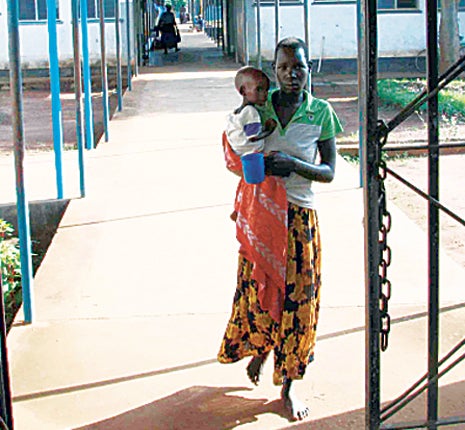Theft and corruption take malaria drugs away from Africa's poorest

Your support helps us to tell the story
From reproductive rights to climate change to Big Tech, The Independent is on the ground when the story is developing. Whether it's investigating the financials of Elon Musk's pro-Trump PAC or producing our latest documentary, 'The A Word', which shines a light on the American women fighting for reproductive rights, we know how important it is to parse out the facts from the messaging.
At such a critical moment in US history, we need reporters on the ground. Your donation allows us to keep sending journalists to speak to both sides of the story.
The Independent is trusted by Americans across the entire political spectrum. And unlike many other quality news outlets, we choose not to lock Americans out of our reporting and analysis with paywalls. We believe quality journalism should be available to everyone, paid for by those who can afford it.
Your support makes all the difference.Widespread government corruption and theft of anti-malarial drugs is preventing the poorest people in Uganda from receiving treatment for a preventable disease that kills 300 people in the country every day, an investigation has revealed.
The Deputy Prime Minister, Nick Clegg, said at the United Nations last week that Britain would treble the amount it spends on tackling malaria in Africa to £500m a year. But an investigation by Channel 4's Unreported World has revealed that Ugandan health officials have sold the pills on the black market, and organised crime gangs are behind a thriving cross-border smuggling operation with Kenya. There are few figures to indicate the scale of the problem, but the office of President Yoweri Museveni was sufficiently concerned to set up a small unit to investigate the theft of government drugs that are passed to fake clinics for sale.
In the last nine months, the unit has made more than 100 arrests and seized anti-malarial drugs worth more than £1.5m. Convictions include government health workers and three senior Health Ministry officials who manage the national malaria control programme.
A raid in Lira, northern Uganda, uncovered drugs embossed with "Government of Uganda – Not for Sale", a box of 600 doses of anti-malarials donated by China, and antimalarial nets from the US.
Reducing malaria deaths remains one of the eight key Millennium Development Goals agreed by world leaders, but despite billions spent, nearly a million people die from the disease each year, most of them in Africa. The international community, including Britain, donated £20m of anti-malaria drugs this year to Uganda which are supposed to be distributed free.
Richard Okoth, a government security official in northern Uganda, said: "The problem is within the health workers. There has been the diversion of drugs, illegally and these drugs will end up in the private clinics and drug shops".
Uganda is among the 10 worst-affected countries, and yet malaria is preventable. Impregnated bednets and insecticide spraying combined with malaria treatment is effective. In Africa, notably in Eritrea, São Tomé and Principe, Rwanda, Zambia and Zanzibar, malaria death rates have almost halved in recent years.
Problems remain in Uganda. The district hospital in Apac Town, northern Uganda, said it struggled with drug shortages. Families were told to go to private clinics to buy them. The hospital pharmacist said: "Here, if you don't have the money, you die."
'Unreported World. Uganda: Malaria Town', Channel 4, 7.30pm tonight
Join our commenting forum
Join thought-provoking conversations, follow other Independent readers and see their replies
0Comments